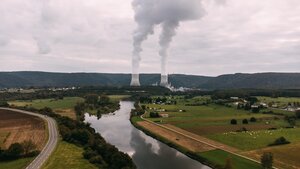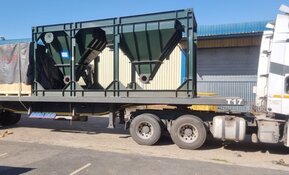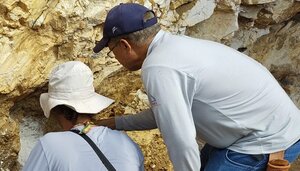Atlas Lithium Corp. (ATLX:NASDAQ) announced exploration results from its wholly owned Salinas Project in Brazil's Lithium Valley.
The company said it has concluded its initial exploratory drilling, with the drill holes revealing spodumene-rich lithium mineralization close to the surface. This marks a crucial step in establishing Salinas as the company's next area for expansion, while still prioritizing the advancement of Atlas Lithium's flagship Neves Project towards production, the company said in a release.
Atlas Lithium reported that exploratory drill holes at the Salinas Project intersected lithium mineralization indicating significant spodumene mineralization at only 23 meters depth.
"The initial drilling results at Salinas have exceeded our expectations," said Chairman and Chief Executive Officer Marc Fogassa. "It appears that our Salinas Project will be another example of a favorable location for future open pit mining and production. It is rewarding to see opportunity for organic growth within the large portfolio of mineral rights that we own."
The Salinas Project covers 388 hectares in northern Minas Gerais, strategically located just 5 miles east of the Colina Project. This was the main reason Pilbara Minerals acquired Latin Resources for around US$370 million in August 2024. Situated approximately 100 kilometers north of Neves, Salinas is in a region known for its lithium potential within Brazil's famous Lithium Valley. The company has carried out extensive exploration activities at Salinas, including systematic soil sampling, detailed geological mapping, LIDAR surveys, and high-resolution aerial photogrammetry. These efforts have successfully identified and mapped several spodumene-rich pegmatite formations.
The diamond drilling completed so far has confirmed the continuity of pegmatite formations, with analytical results from SGS-Geosol, a leading analytical laboratory, showing Li₂O grades exceeding 2.0%, highlighting strong geological potential, the company said. The proximity of lithium mineralization to the surface suggests favorable conditions for cost-effective open-pit mining, similar to the Atlas' Neves Project.
Numerous Pathways to Organic Growth
Atlas Lithium is strategically poised to leverage its extensive regional lithium exploration assets in Brazil, with the Salinas Project emerging as a key prospect for the Company's future growth initiatives. Located in the core of the northern lithium district and supported by outstanding initial drilling results, Salinas is a natural extension of Atlas Lithium's production strategy.
"The Salinas Project represents a compelling growth opportunity that could significantly expand our future production capacity," stated Eduardo Queiroz, Atlas Lithium's project management officer and vice president of engineering. "The combination of proven mineralization and proximity to Pilbara's Colina Project validates our strategic vision for regional growth."
With a vast 797 km² lithium exploration footprint — the largest among publicly traded companies — Atlas Lithium has numerous pathways for organic growth beyond Salinas.
While advancing the Salinas Project, Atlas Lithium remains dedicated to prioritizing the development of Neves. The recently completed Definitive Feasibility Study (DFS) for the Neves Project showcases outstanding project economics, positioning Atlas Lithium as one of the most capital-efficient lithium developers globally.
Key highlights from the Neves Project DFS include an Internal Rate of Return (IRR) of 145%, a payback period of 11 months from the start of operations, an after-tax Net Present Value (NPV) of US$539 million, operating Costs of US$489 per tonne of lithium concentrate, and direct capital expenditure of US$57.6 million.
The company has already invested around US$30 million in acquiring and transporting the Neves Project's newly fabricated dense media separation (DMS) plant to Brazil. This ready-to-assemble DMS processing facility, capable of producing up to 150,000 tpa of lithium concentrate, is now stored in Brazil awaiting on-site assembly. Furthermore, the Neves Project received its "Portaria de Lavra" (mining concession) status from Brazil's Ministry of Mines and Energy on May 27, 2025, granting the highest level of titleship in Brazil and one that allows for continuous mining operations.
"Our dual-track strategy of advancing Neves to production while systematically expanding our potential for growth through exploration in Salinas and other sites creates compelling value," added Fogassa.
Next Producer in Brazil's Lithium Valley?
Jake Sekelsky, an analyst with Alliance Global Partners, noted in an August 5 research report that the "limited capex remaining, coupled with Neves' status as a shovel-ready project, place Atlas in pole position to become the next lithium producer in Brazil's lithium valley over the next year."
Sekelsky wrote that he expects Atlas to keep moving forward at Neves despite lithium market headwinds because of the project's low-cost structure and limited capex needed to take it to production. That said, the analyst expects lithium prices to start moving up as 2026 approaches, coinciding with Atlas' project development ramp-up. Sekelsky also pointed out the expansion potential upside as Atlas could, down the line, increase plant capacity to 300,000 tons per year of SC5.5 from 150,000. Sekelsky has a Buy rating and a target price on Atlas, implying a potential return for investors of 235%.
H.C. Wainwright Analyst Ihle also rates Atlas Buy, and his target on the lithium developer suggests a possible 201% uplift, according to his report. In it, the analyst highlighted how close Atlas is to producing battery-grade spodumene concentrate and how it already secured agreements tied to future production, with Chengxin and Yahua, two major lithium companies, and Mitsui & Co. Ltd., a general trading company.
Also, noted Ihle, subsidiary Atlas Critical Minerals, with about 54,000 hectares of property prospective for total rare earth oxides, titanium, graphite, and, potentially, uranium, strengthens Atlas Lithium's position in Brazil's critical minerals sector.
"This project complements the firm's Neves project, as we expect the near-term cash flow to support Atlas' long-term strategy of becoming a leading player in [the] global energy transition," wrote Ihle.
The Catalyst: Fundamentals Are 'Still Very Strong'
Lithium prices and equities surged last week following the unexpected closure of the Jianxiawo lepidolite mine in China due to noncompliance with permitting requirements.
"The current situation underscores lithium's emergence as a truly strategic commodity in the global transition to electrification, where supply disruptions can trigger immediate and substantial market reactions across multiple industries and continents," wrote Mark Reichman, a research analyst at Noble Capital Markets, in an August 11 report.
On that day alone, lithium spot prices jumped nearly 4%, while lithium producers saw their stock prices rise between 9% and 20%, according to Reichman. By the close of trading on Tuesday, August 12, spot lithium had reached US$10,850 per metric ton, an 8.5% increase from US$10,008 at the end of the previous week.
The impact of the Jianxiawo shutdown on global lithium oversupply is difficult to assess, given the uncertainty about how long the closure will last. According to Benchmark in an August 12 article, the recent rise in lithium prices is largely driven by sentiment and reflects the speculative nature of lithium trading in Asia.
MST Financial attributed the price movement to supply concerns amid speculation that the mine could remain closed for much longer than the three months announced by its owner, Contemporary Amperex Technology Co. Ltd. (CATL), potentially extending up to a year, as reported by Stockhead on August 11. CATL is China's largest lithium battery producer.
Dr. Cam Perks, Benchmark's lithium product director, told Stockhead that the mine is crucial to the local economy, supplying 30% of the area's lithium refineries, making a prolonged closure unlikely.
"The fundamentals are really still very strong, and these are anchored in some very powerful, megatrends that we see developing within the global economy: the urgent drive for climate change mitigation, the once in a generational shift in the global energy system and also the rise of energy intensive technologies such as artificial intelligence," he said.
Despite current oversupply conditions, global lithium production capacity is expected to exceed demand by about 100,000–150,000 tons through 2025. "One mine suspension alone is unlikely to rebalance the market," an Aug. 11 Discovery Alert article stated. "The market will likely require multiple quarters of coordinated production restraint before a sustainable uptrend can develop."
In contrast, Barry Dawes, executive chairman of Martin Place Securities, wrote in an August 11 note that the necessary adjustments to reduce inventory levels have occurred, the lithium market has bottomed, and more than half of lithium production costs are higher than the current lithium price. With strong underlying demand growth, prices are poised to rise, signaling the start of a new lithium bull market. "Lithium has been the most hated sector in the market for some time," Dawes wrote. "The wheel turns."
Ownership and Share Structure
According to Atlas Lithium, its management and insiders own about 27% of the company's shares. Strategic partners, including Mitsui & Co., hold another roughly 11%. Institutional investors own about 10%. The rest, about 52%, is in retail.
Refinitiv reports that Atlas has 19.58 million outstanding shares, and 11.43 million free float traded shares. Its market cap is US$116.32 million. Its 52-week range is US$3.54–12.48 per share.
| Want to be the first to know about interesting Battery Metals and Cobalt / Lithium / Manganese investment ideas? Sign up to receive the FREE Streetwise Reports' newsletter. | Subscribe |
Important Disclosures:
- Atlas Lithium Corp. is a billboard sponsor of Streetwise Reports and pays SWR a monthly sponsorship fee between US$4,000 and US$5,000.
- As of the date of this article, officers and/or employees of Streetwise Reports LLC (including members of their household) own securities of Atlas Lithium Corp.
- Steve Sobek wrote this article for Streetwise Reports LLC and provides services to Streetwise Reports as an employee.
- This article does not constitute investment advice and is not a solicitation for any investment. Streetwise Reports does not render general or specific investment advice and the information on Streetwise Reports should not be considered a recommendation to buy or sell any security. Each reader is encouraged to consult with his or her personal financial adviser and perform their own comprehensive investment research. By opening this page, each reader accepts and agrees to Streetwise Reports' terms of use and full legal disclaimer. Streetwise Reports does not endorse or recommend the business, products, services or securities of any company.
For additional disclosures, please click here.










































